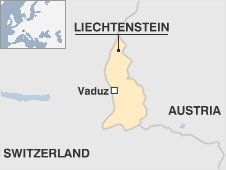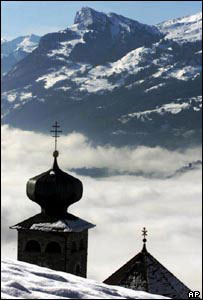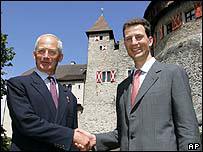 |
The Principality of Liechtenstein is a tiny landlocked country tucked away between Switzerland and Austria and with mountain slopes rising above the Rhine valley.
Much of its wealth is based on its status as a low tax haven. Around 75000 companies have their nominal "letter box" offices in Liechtenstein where business tax rates are very favourable.
Overview
This status came under the spotlight in 2000 when two international reports criticised Liechtenstein for lax financial controls. The reports said that the Liechtenstein banking system enabled gangs from Russia Italy and Colombia to launder money from their criminal activities.

Alpine slopes cover two-thirds of the territory
|
Stung by the criticism Liechtenstein has gradually reformed some of its laws. Customers opening bank accounts may now no longer remain anonymous.
However in 2008 Liechtenstein remained one of only three states described as "unco-operative tax havens" by the Organisation for Economic Co-operation and Development (OECD).
Liechtenstein remained neutral in World War II. A report commissioned by the government in 2001 after allegations that the country's banks had had dealings with the Nazis found that the banks' actions had been above board. It also found that slave labour from Nazi concentration camps had been used on Crown estates in Austria but described the principality as a bystander rather than a perpetrator.
The country has come through a lengthy political wrangle over the role and power of the hereditary monarchy.
After a campaign which was at times bitterly divisive the people voted in March 2003 in a constitutional referendum to give Prince Hans-Adam sweeping new political powers. The outcome was decisive with just over 64% in favour of the changes.
In effect the referendum made Liechtenstein Europe's only absolute monarchy. It gave Prince Hans-Adam the power to hire and fire the government despite publicly-expressed fears that the development could usher in dictatorship.
The Roman Catholic church has traditionally had a strong role in Liechtenstein. Women faced a year in jail for having abortions until new legislation legalised it in late 2005. A bid by pro-life activists to stop the legislation from being passed failed when voters strongly rejected their proposals in a referendum.
Facts
- Full name: Principality of Liechtenstein
- Population: 35000 (UN 2009)
- Capital: Vaduz
- Area: 160 sq km (61.8 sq miles)
- Major language: German
- Major religion: Christianity
- Life expectancy: 75 years (men) 82 years (women)
- Monetary unit: 1 Swiss franc = 100 centimes
- Main exports: Machinery dental products foodstuffs stamps
- GNI per capita: n/a
- Internet domain: .li
- International dialling code: +423
Leaders
Head of state: Prince Hans-Adam II
Prince Hans-Adam a successful banker became head of state following the death of his father Prince Franz Josef in 1989. In August 2004 he handed over the day-to-day running of the principality to his son Crown Prince Alois while remaining titular head of state.

Prince Hans-Adam II (left) with Prince Alois: Royals can veto laws dismiss governments
|
In 2003 the royals won sweeping new powers in a constitutional referendum which gave them the power to veto parliamentary decisions and to sack the government.
The family also won powers over the appointment of judges powers which Prince Hans-Adam said were essential to ensure that the judiciary was independent enough to tackle tasks such as chasing illegal assets effectively.
Prince Hans-Adam pointed out that the changes to the constitution took away his right to rule by emergency decree for an unlimited period and to nominate government officials.
Prince Hans-Adam 58 at the time of the referendum had threatened to leave Liechtenstein for Austria if he lost.
Prince Alois who was 36 when he took over the running of his country trained at Britain's Sandhurst military academy. He is the eldest of Prince Hans-Adam's four children.
Prime minister: Klaus Tschuetscher
Klaus Tschuetscher took over as prime minister after his conservative Patriotic Union (PU) won an absolute majority in parliament allowing the party to form a government on this own.
The previous government led by Otmar Hasler of the Progressive Citizens Party (PCP) was a coalition of the PCP and PU.
Mr Tschuetscher has said he seeks to rid the principality of its image as an "uncooperative tax haven" promising to work with the Organisation for Economic Co-operation and Development (OECD) in combating tax fraud.
Media
Liechtenstein has a very sparse media scene with the circulation figures of its newspapers at around 10000 or less.
Its citizens rely on foreign and satellite broadcasters for most TV and radio services.
The press
Radio
-
Radio Liechtenstein
AFRICA | ASIA-PACIFIC | AMERICAS | EUROPE | MIDDLEEAST | SOUTHASIA
Mauritania Mauritius Morocco Mozambique Namibia Niger Nigeria Republic-of-congo Rwanda Sao-tome-and-principe Senegal Seychelles Sierra-leone Somalia South-africa Sudan Swaziland Tanzania The-gambia Togo Tunisia Uganda zambia Zimbabwe Australia Brunei Burma Cambodia China East-timor Fiji Indonesia Japan Kazakhstan Kiribati Kyrgyzstan Laos Malaysia Marshall-islands Micronesia Mongolia Nauru New-zealand North-korea Palau Papua-new-guinea Samoa Singapore Solomon-islands South-korea Taiwan Tajikistan Thailand The-philippines Tonga Turkmenistan Tuvalu Uzbekistan Vanuatu Vietnam Antigua-and-barbuda Argentina Bahamas Barbados Belize Bolivia Brazil Canada Chile Colombia Costa-rica Cuba Dominica Dominican-republic Ecuador El-salvador Grenada Guatemala GuyanaHaiti Honduras Jamaica Mexico Nicaragua Panama Paraguay Peru St-kitts-and-nevis St-lucia St-vincent-and-the-grenadines Suriname Trinidad-and-tobago United-states-of-america Uruguay Venezuela Albania Andorra Armenia Austria Azerbaijan Belarus Belgium Bosnia-hercegovina Bulgaria Croatia Cyprus Czech-republic Denmark Estonia Finland France Georgia Germany Greece Hungary Iceland Ireland Italy Latvia Liechtenstein Lithuania Luxembourg Macedonia Malta Moldova Monaco Montenegro Norway Poland Portugal Russia San-marino Serbia Slovakia Slovenia Spain Sweden Switzerland The-netherlands Turkey Ukraine United-kingdom Vatican Algeria Egypt Iran Iraq Israel-and-palestinian-territories Jordan Kuwait Lebanon Libya Mauritania Oman Saudi-arabia Sudan Syria Tunisia United-arab-emirates Yemen Afghanistan Bangladesh Bhutan India Nepal Pakistan Sri-Lanka The-Maldives

